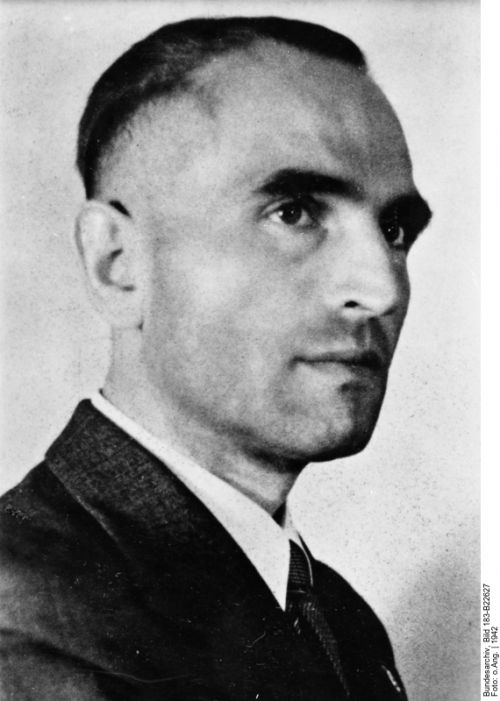Werner Best

Werner Best (Bundesarchiv)
Werner Best was born on 10 July 1903, in Darmstadt. His parents moved to Dortmund in 1912, and then to Mainz, where Werner Best completed his education. After the First World War - his father a senior postmaster had fallen in France at the beginning of the conflict in 1914 - Best founded the first local group of the German National Youth League and became active in the Mainz group of the German National People's Party, all before he was twenty years of age.
From 1921, to 1925, he studied law at Frankfurt am Main, Freiburg, Giessen and Heidelberg, where he received his doctorate in 1927. During these years he was strongly influenced by the German youth movement with its return to nature, its Germanic myths and volkisch world-view. He was twice imprisoned between the end of 1923, and the spring of 1924, by the French authorities during the nationalist struggle in the Ruhr region. During 1929, he was appointed as a judge in the Hessian Department of Justice, but was forced to resign from his position two years later when the so-called Boxheim documents were found in his possession. The name came from the Boxheim estate near Worms, where groups of National Socialists held meetings to discuss a plan for seizing power after a hypothetical communist revolution. The documents which bore Best's signature and contained a blueprint for a Nazi putsch and the subsequent execution of political opponents, embarrassed Hitler at a time when he was seeking power by legal means. In spite of this Best was made Police Commissioner in Hessen in March 1933, and by July of the same year, he was appointed Governor.
Werner Best advanced rapidly in the next six years, becoming Reinhard Heydrich's and Heinrich Himmler's deputies, he performed the role of chief legal advisor to the Gestapo - helping it to get rid of 'relics' from the old Weimar legal system and demonstrating how to operate by means of orders for preventive arrests without judicial checks, as well as holding the position of Chief of the Bureau of the Secret State Police at the Reich Ministry of the Interior. The ambitious Best, a cool, amoral technician of power, used his academic and legal skills to justify the totalitarian practice of the Nationalist Socialist Fuhrer State which corresponds to the ideological principle of the organically indivisible national community. The role of the political police was to fight all symptoms of disease in the national organism, to discover the enemies of the State, to watch them and render them harmless at the right moment. As a leading constitutional theoretician and Nazi jurist in the Third Reich, Best did a great deal to give respectability and legitimacy to the political police and the concentration camps. As long as the Gestapo was carrying out the will of the leadership it was, in his view, 'acting legally.'
By 1935, Werner Best was already a Standartenfuhrer, in rank, and he was the closest collaborator of Reinhard Heydrich in building up the Gestapo and the Sicherheitsdienst (SD- Security Service). Between 27 September 1939, and 12 June 1940, Best was Chief of Section 1 of the RSHA (Reich Main Security Office) and it was in this capacity that he was charged twenty-five years after the war with complicity in the murder of thousands of Jews and Polish intellectuals in occupied Poland.
After leaving the RSHA, Werner Best served for the next two years as Chief of the Civil Administration in occupied France and was involved in fighting the French Resistance and the deportation of the Jews. The climax of his career came in Denmark, where he was Reich Plenipotentiary from November 1942, to 1945. In spite of his record as a 'desk murderer,' there is evidence that in Denmark Best sought to sabotage Himmler's orders concerning the implementation of the 'Final Solution.' Only 477 out of more than 7,000 Danish Jews were finally rounded up by German forces, who were forbidden by Best to break into Jewish apartments.
Werner Best was originally sentenced to death by a Danish court in 1948, following his extradition, but his sentence was commuted to five years and he was granted a clemency release in August 1951. He returned to West Germany, working for a time in a solicitor's office and then as a lawyer for Hugo Stinnes Company, one of the largest German trading concerns.
In 1958, he was fined 70,000 marks by a Berlin de-Nazification for his past activities as a senior SS officer. In March 1969, he was held in detention for new investigations concerning responsibility for mass murder, finally charged in February 1972, but was released in August 1972, on medical grounds, though the charges were not withdrawn.
Werner Best was one of the most important figures of the Third Reich, the author of a famous book on the police, 'Die Deutsche Polizei' published in 1941, a free-floating intellectual with a blurred sense of morality who devoted his legal talents to the service of a power-mad clique of criminals. Werner Best's role remains ambiguous, at least in relation to his time in Denmark. A combination of personal ambition, opportunist careerism and ideological inclinations drove him to the apex of the Nazi system, where he helped ensure the smooth functioning of a system of terror. Yet at the end of his National Socialist career it would appear that he belatedly began to revert to that respect for law which he had done so much to destroy from within during the National Socialist era.
Werner Best died in Mulheim, North Rhine -Westphalia on 23 June 1989.
Sources
R.S. Wistrich, Who’s Who in Nazi Germany, published by Routledge, London and New York 1995
G. Reitlinger, The Final Solution, published by Sphere Books Ltd, London 1971
Photograph – Bundesarchiv
© Holocaust Historical Society 2018

